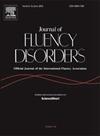父母讲述他们的口吃之旅:经验和适应的初步探索
IF 2.1
3区 医学
Q1 AUDIOLOGY & SPEECH-LANGUAGE PATHOLOGY
引用次数: 0
摘要
背景/目的父母对口吃的态度和情绪有可能影响他们对孩子说话的反应。许多父母对口吃缺乏足够的了解,这往往导致孩子开始口吃时感到内疚、不确定和无助。然而,这些经验可能会在以后发展。本研究旨在探讨父母的经历,以及他们对这些经历自发病以来如何变化的反思。方法对5名口吃儿童家长进行半结构化访谈,并对另外9名口吃儿童家长进行匿名在线问卷调查。内容分析用于识别父母经历中的模式,主题分析用于描述其变化和适应过程的组成部分。结果出现了四个主题:1)父母的动态情绪,反映了父母所经历的波动情绪;2)社会妥协,父母为孩子的口吃做出牺牲;3)积极和保护性养育,包括努力支持和保护他们的孩子;4)除了口吃,还要强调承认孩子的长处。此外,我们还建立了一个初步的框架来描述父母的适应过程,包括六个组成部分:情感斗争、关注和不确定性、向行动的过渡、寻求支持和教育、准备和授权以及接受。这些组件以非线性的方式体验。结论本研究增强了我们对父母经历的与孩子口吃有关的社会情感历程的理解。研究结果强调需要采取干预措施,支持儿童和家庭,解决父母面临的挑战。本文章由计算机程序翻译,如有差异,请以英文原文为准。
Parents recounting their journey with stuttering: A preliminary exploration of experiences and adaptation
Background/purpose
Parents' attitudes and emotions toward stuttering have the potential to impact their reactions to their child's speech. Many parents lack sufficient knowledge about stuttering, which often leads to guilt, uncertainty, and helplessness when their child begins to stutter. However, these experiences may evolve later. This study aimed to explore parents' experiences, as well as their reflections on how these experiences have changed since the onset.
Method
Semi-structured interviews were conducted with 5 parents of individuals who stutter, and 9 other parents chose to complete an anonymous online survey with similar questions. Content analysis was used to identify patterns in parents’ experiences, and thematic analysis was used to delineate the components of their change and adaptation process.
Results
Four main themes emerged: 1) dynamic emotions of parents, reflecting the fluctuating feelings parents experienced; 2) social compromises, where parents made sacrifices because of their child’s stuttering; 3) proactive and protective parenting, involving efforts to support and protect their child; and 4) beyond stuttering, emphasizing the recognition of the child's strengths. Furthermore, a preliminary framework was developed to describe parents' process of adaptation, encompassing six components: emotional struggles, concern and uncertainty, transition to action, seeking support and education, preparation and empowerment, and acceptance. These components were experienced in a non-linear fashion.
Conclusion
This study enhances our understanding of the socio-emotional journey that parents undergo in relation to their child's stuttering. The findings highlight the need for interventions that support both the child and the family and address the challenges parents face.
求助全文
通过发布文献求助,成功后即可免费获取论文全文。
去求助
来源期刊

Journal of Fluency Disorders
AUDIOLOGY & SPEECH-LANGUAGE PATHOLOGY-REHABILITATION
CiteScore
3.70
自引率
14.30%
发文量
23
审稿时长
>12 weeks
期刊介绍:
Journal of Fluency Disorders provides comprehensive coverage of clinical, experimental, and theoretical aspects of stuttering, including the latest remediation techniques. As the official journal of the International Fluency Association, the journal features full-length research and clinical reports; methodological, theoretical and philosophical articles; reviews; short communications and much more – all readily accessible and tailored to the needs of the professional.
 求助内容:
求助内容: 应助结果提醒方式:
应助结果提醒方式:


